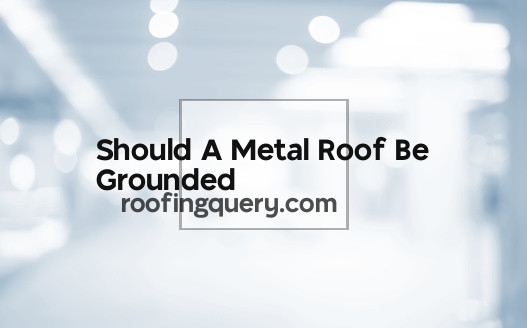Yes, a metal roof should be grounded.
When it comes to deciding whether or not to ground a metal roof, there are a few things to consider. For instance, if your roof is near power lines or if there is a history of lightning strikes in your area, grounding your roof may be a wise precaution. However, even if neither of these factors are present, grounding your roof may still be a good idea. This is because metal roofs can act as giant lightning rods during thunderstorms, which could potentially damage your home or injure those inside. Ultimately, the decision of whether or not to ground a metal roof is up to you and should be based on your specific situation.
What Are The Benefits Of Grounding A Metal Roof?
The benefits of grounding a metal roof are that it helps to dissipate static electricity, protects against lightning strikes, and helps to reduce electromagnetic radiation.
When it comes to grounding a metal roof, there are several benefits that come along with it. For starters, grounding the roof helps to dissipate any static electricity that could build up and potentially cause a fire. Additionally, grounding the roof helps to protect the roof from lightning strikes, as well as any other type of electrical damage. Finally, grounding the roof also helps to reduce the amount of noise that is produced by the roof, which can be beneficial for both the homeowner and their neighbors.
Why Is It Important To Ground A Metal Roof?
It is important to ground a metal roof to protect it from lightning.
Most metal roofs are not grounded, which can lead to serious problems during a lightning storm. If your house is struck by lightning, the electrical current can travel through the metal roof and into your home, causing serious damage or even starting a fire. Grounding your metal roof will help protect your home from this type of damage.
To ground a metal roof, you will need to attach a grounding rod to the roof. You can do this yourself or hire a professional to do it for you. Once the grounding rod is in place, you will need to attach a grounding wire to the rod and run it down the side of your house to the ground. This will provide a path for the electrical current to follow if your house is struck by lightning.
While it may seem like a lot of work to ground a metal roof, it is important to do it if you want to protect your home from damage. If you live in an area that is prone to lightning storms, it is especially important to take this precaution.
What Are The Risks Of Not Grounding A Metal Roof?
If a metal roof is not grounded, it poses a risk of electrocution.
Most people don’t think about the risks of not grounding a metal roof, but it’s a real problem. Lightning is one of the leading causes of fires in the United States, and a metal roof is a giant lightning rod. If your roof is not properly grounded, it could be struck by lightning and catch fire.
In addition to the risk of fire, not grounding your metal roof can also lead to electrical shocks. If someone were to touch the metal roof during a thunderstorm, they could be electrocuted.
The best way to protect your home from these risks is to have a professional ground your metal roof. This process involves attaching copper wires to the roof and connecting them to ground rods buried in the ground. This will dissipate the electrical charge from a lightning strike and keep your home safe.
What Are The Consequences Of Not Grounding A Metal Roof?
If a metal roof is not grounded, it may become electrically charged during a lightning storm and pose a risk of electrocution.
If you don’t ground a metal roof, you may be putting your home at risk for damage from lightning strikes. Lightning can cause a lot of damage to a home, and if your home is not properly grounded, it could be at risk. Grounding a metal roof will help to protect your home from lightning strikes.
FAQ
How Can You Tell If A Metal Roof Is Grounded?
Is It Necessary To Ground A Metal Roof?
What Are The Advantages Of Grounding A Metal Roof?
What Are The Disadvantages Of Not Grounding A Metal Roof?
I hope that this article has clarified any questions that you may have had about grounding a metal roof. If you have any further questions, please feel free to leave a comment below.


